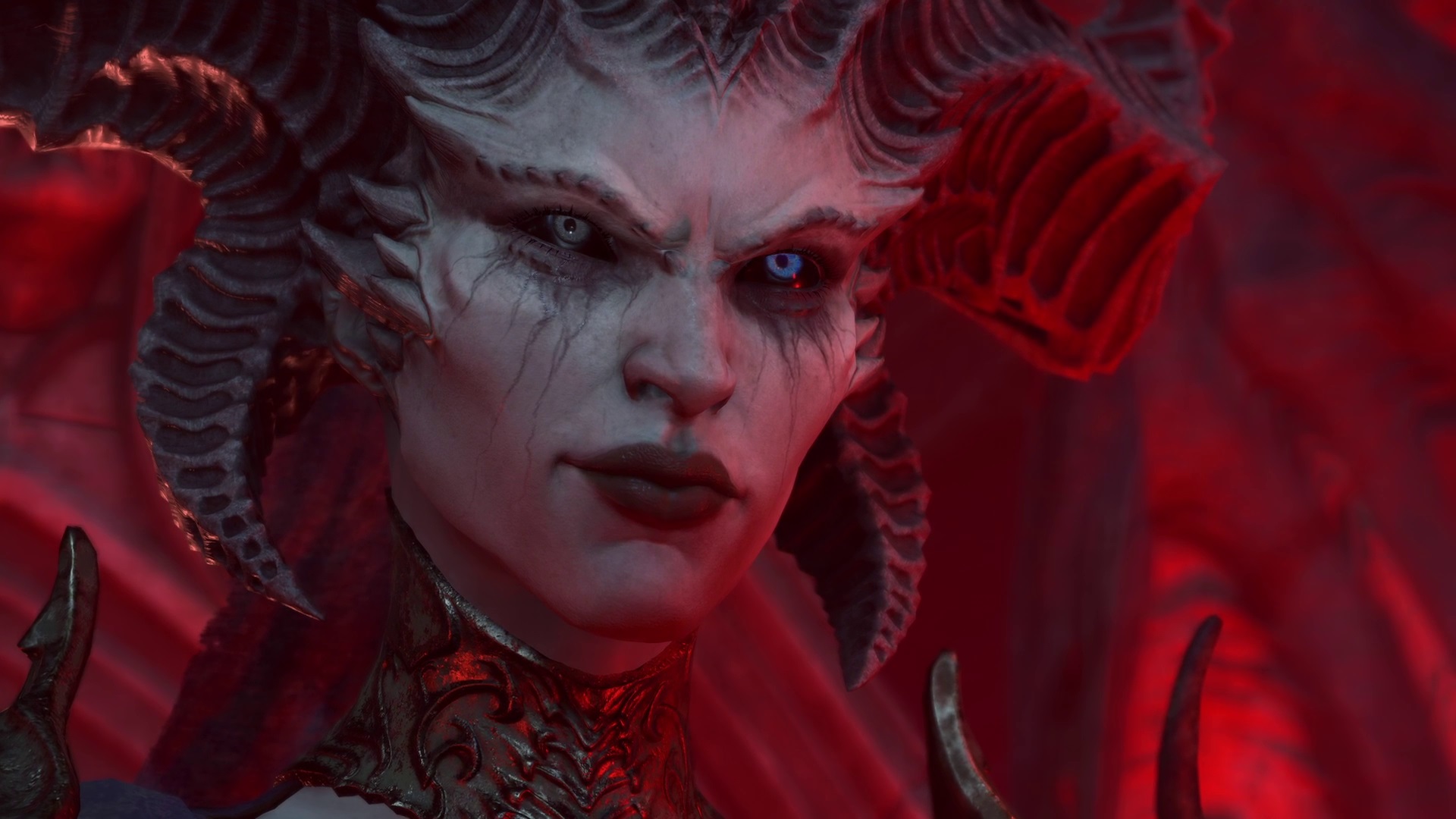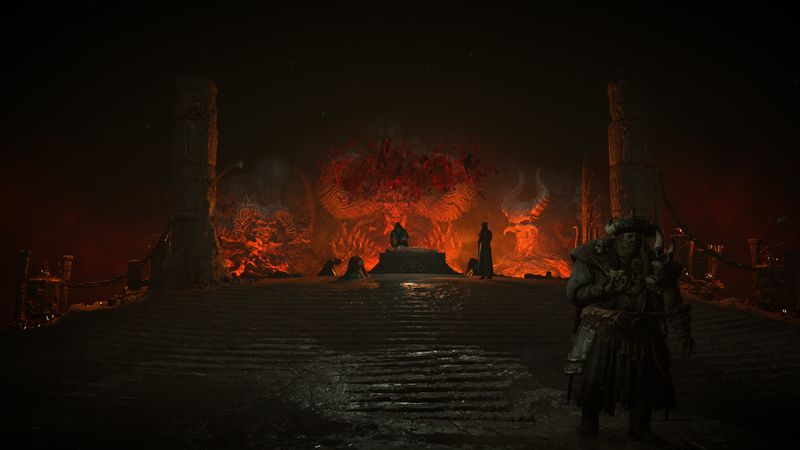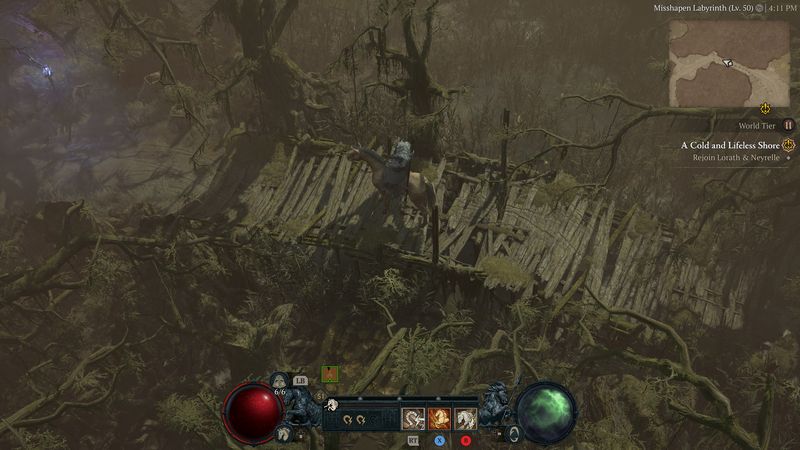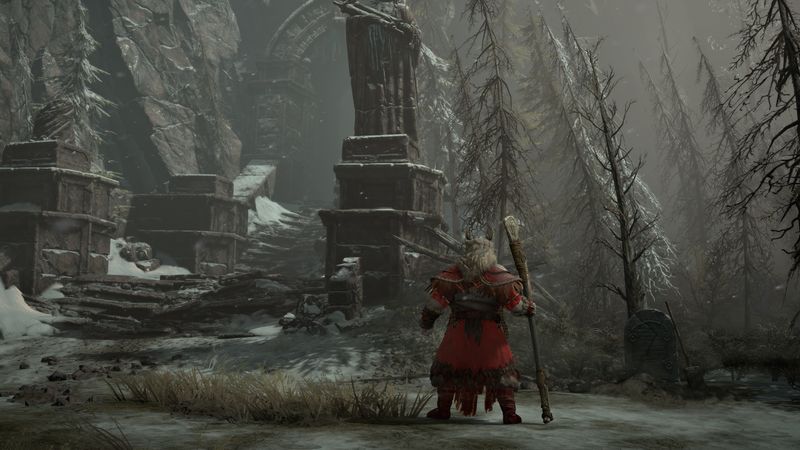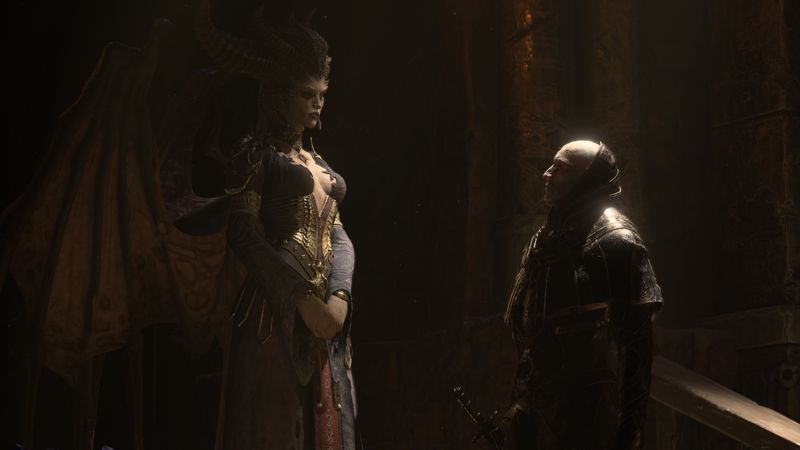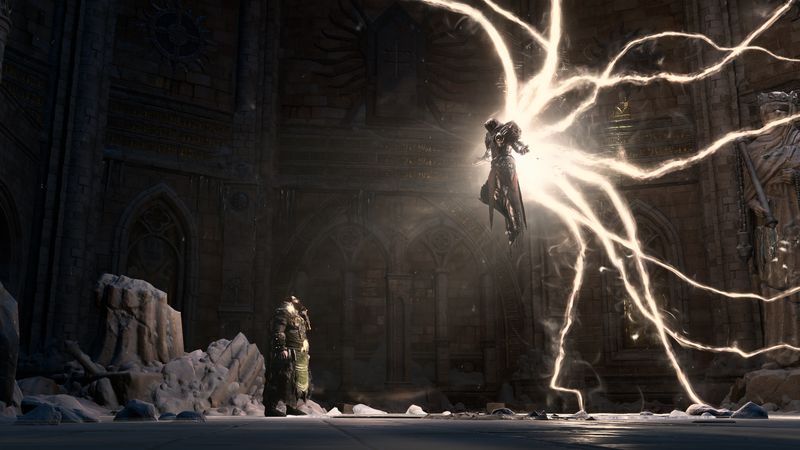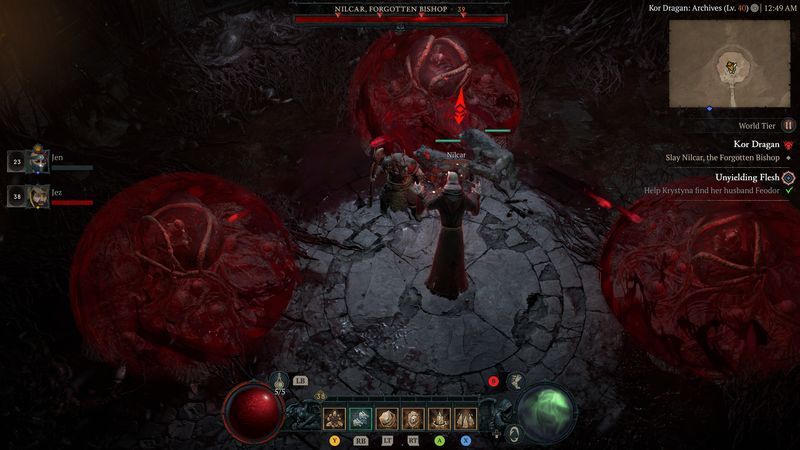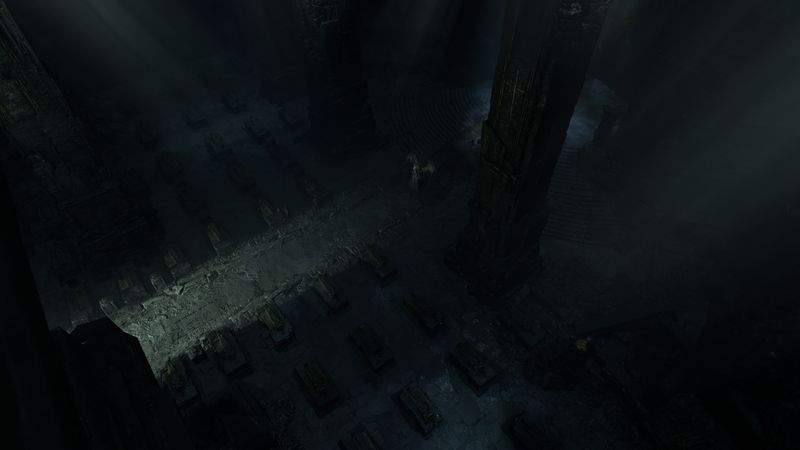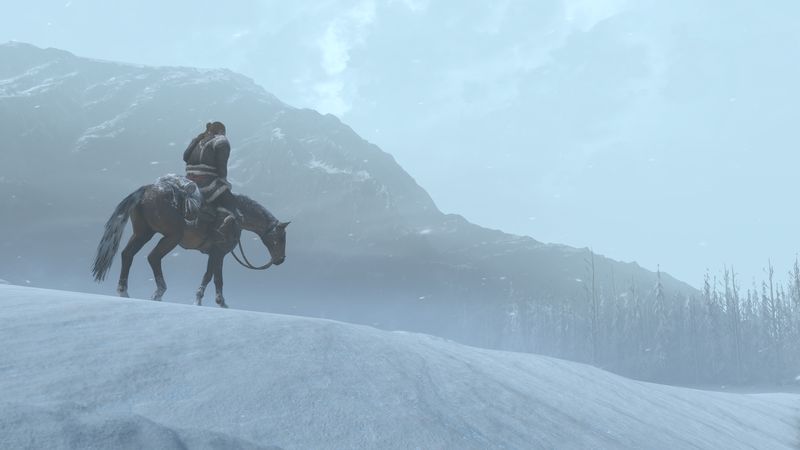Windows Central Verdict
Simply put, Diablo 4 may be Blizzard's best-ever game, and that's a really tough legacy to live up to. Immaculate storytelling meets stunning art, polished, bug-free gameplay, atop endlessly customizable combat with the promise of dozens, maybe hundreds of hours of content — Diablo 4 might be Blizzard's most important, pivotal game since World of Warcraft. Do yourself a favor and go in completely blind. Even if you're not a typical fan of isometric action RPGs, I'm confident that you won't be disappointed.
Pros
- +
Excellent story delivery, with top-shelf voice acting and writing
- +
Stunning visuals, the best ever seen in the genre
- +
Exciting combat with endless customization
- +
Flawless performance with near-zero bugs
Cons
- -
Re-use of enemies, events, and dungeon layouts gets heavy and detracting
- -
Keybind customizability on console needs improvement
Why you can trust Windows Central

Platforms: Xbox Series X|S, PlayStation 5, PC
Price: $69.99
Genre: Action RPG
Developer: Blizzard Entertainment
Players: 1-4 in online co-op
Campaign length: 30-50 hours
Launch date: June 6, 2023 | Diablo 4 launch times.
Review code provided by Blizzard Entertainment. Reviewed primarily on Xbox Series X.
As I sit here, I finished Diablo 4 this past week. I spent a few days dabbling with its endgame and gathering my thoughts. I knew immediately after I'd rolled the credits that I was dealing with a 5/5 game, an entry in a legendary franchise that defies all expectations — a title that will easily win dozens of game of the year awards and sit among 2023's most incredible titles. What I didn't expect is that I'd be sitting here, as a decades-long Blizzard fan across Warcraft, StarCraft, and indeed, Diablo, wondering if Diablo 4 is, in fact, Blizzard's best-ever game.
Diablo 4 is an absolute masterpiece. There's no other way to describe it. Absolutely staggering art and breadth, Oscar-worthy writing and story delivery, both new and returning characters wholly worthy of Blizzard's epic pantheon of heroes and villains. After dozens of hours in the game's beta tests, I knew Diablo 4 was going to be special — a game I would undoubtedly sink hundreds of hours into. What I didn't expect was one of the best story campaigns I've experienced in the past decade, one that elevates Blizzard as a whole. It's the type of game that I worry is becoming increasingly rare in the AAA industry, chasing trends and short-term gains.
This review will be entirely spoiler free, played on Xbox Series X on World Tier 2. I plan to do a separate article going over the story in more spoilery detail later on. Additionally, we'll have a separate review going live for endgame some time after launch since a fair bit of it was unavailable to experience in the underpopulated review build servers. But, even without these aspects, this fully-priced title is more than worth the price of admission, comprising a 30-50 hour campaign full of sorrow and darkness, with flickers of hope, weaving a starkly poignant tale that is as unsettling as it is majestic. This may be Blizzard's magnum opus. This is Diablo 4, and my tale as the wandering druid.
Diablo 4 Review: Art, Performance, and Setting
Blizzard has had a tumultuous few years, to say the least, with the quality of its games dipping in some areas while finding success in others. Blizzard was once upon a time renowned for its consistency, and I would say that if there's one area that has remained consistent at the firm, it's in art quality. Diablo 4 is surely no exception.
Clearly absorbing the criticisms that Diablo 3 looked too "colorful," Diablo 4 is among the darkest, grittiest, bloodiest games I've ever experienced. The game thrums with a foreboding aura, wholly appropriate for the game's setting and story, which are equally as bleak.
Sanctuary is a dimension not dissimilar from Earth, strewn between the high heavens and the depths of hell. As such, you'll find similar biomes across the game's truly gargantuan, continuous open world. Dank, fetid swamps filled with snakes and bristling with poison. Wintry climbs beset with frost-bitten undead and starving predators. An expansive sand-blasted desert with hidden tombs and treacherous crags. Sanctuary is absurdly huge, even without considering the vast array of dungeons, keeps, strongholds, and story setpiece areas that comprise this sizeable 50+ hour campaign.
Diablo 3 was criticized for being too "cartoony," as well as too colorful. Diablo 1 and 2 approached photorealism as best they could with the technology available at the time, but Diablo 3's switch to true 3D imparted constraints that have been completely cast aside in Diablo 4. Here, we have true photorealism, with some of the most meticulous and uncanny character art ever seen in a game.
All the latest news, reviews, and guides for Windows and Xbox diehards.
The cinematics quite honestly give massive-budget movies like Avatar a run for their money and showcase Blizzard at their cutting-edge best. The demoness Lilith is unsettling in her delivery, with an utterly terrifying stage presence flanked by demonic orchestral overtures and impeccable acting. The same can be said for all the game's characters, which feature some of the greatest casting and facial motion capture we've seen from the medium thus far.
Diablo 4 uses a combination of in-engine cinematics and pre-rendered full motion picture quality CGI to tell its story. Both sides of the coin work incredibly well. Despite being a zoomed-out isometric title most of the time, the majority of the game's assets are incredibly detailed with high-quality textures. With the camera moving seamlessly from a top-down view to a character-level view, it feels incredibly natural and elevates Diablo 4 far above the rank and file of its imitators. Blizzard uses these camera tricks to also showcase some of the game's landscapes.
Fixed camera perspective games often don't really need to build entire facades for their architectures and landscapes since most of the view is hidden from the player. Blizzard shrugged this off in some cases and opted to build out some of its environments in full 3D despite the fact the camera will remove them from view a lot of the time.
There are viewports in the game that allow you to snap a glimpse at the landscape from a character-level view, showcasing some of the stunning design work Blizzard's artists have done. It's a nice touch purely from an art-appreciation angle, but it also helps immerse the player, enhancing the idea that you're entering real physical locations rather than simply the flat areas we see with the top-down camera. Diablo 4 plants the quality bar very, very high.
I played a large amount of Diablo 4 using headphones too, and once again, the sound direction is top-notch. Whether it's squelching through blood-soaked moors or struggling through tesselated snowscapes, Diablo 4's sound design has a big impact on the environmental immersion, but also the combat feel. Some of the necromancer's spells, gory as they are, disturbed me to think how Blizzard arrived at these realistic bone and flesh-splitting preludes. I played druid for most of my time with the review, and the thundering stomp of rock and earth spells, crushing enemies into mulch, was endlessly gratifying.
If there's a single solitary criticism I can throw at the game's art treatment, is perhaps budgeting for monster assets. There are a ton of twisted abominations and hellish demons in Diablo 4, but the game's world is so, so expansive, that the reuse of enemies becomes aggressively noticeable about halfway through the game. Most zones have a different color variant of bear, a different shade of skeleton, and a different hue of walking tree. It detracts from the diversity of the game's dungeons and biomes to see repetition creep in over time, where the only differentiator between the different types of bandits you'll see is the color of the shirt they're wearing.
It's also immersion-busting when the "swamp cave" you're delving into looks suspiciously identical to the "sewer" you plundered on the literal opposite end of the continent. Each area does have its signature creatures, but I think each zone at the least could've used more unique beasties to help elevate their biome identity, but it's probably greedy of me. The game is absolutely massive, so I can appreciate where constraints for time and budget may have put limiters down.
Diablo 4's clever music system helps offset the sense of repetition, too, with an engine that randomizes the instruments playing each piece of the melody, dynamically constructing new sound treatments on the fly. Boss battle music also ascends in intensity as the health diminishes, which adds gravitas to each battle.
Either way, it has been an incredibly long time since a game made me feel so immersed through its visuals, sound, and character delivery alone. I saw almost zero performance degradation or bugs with my time in the game on Xbox Series X, but it stands true that the review servers were utterly unpopulated. It remains to be seen how well it performs on launch day, but I'm fairly confident from the game's multiple betas that it will stand up to launch day woes.
The art quality is just a single aspect of the game's whole, and I may need a whole additional article to really gush over how great the work here is. I suspect Blizzard will win awards based on this aspect of the game alone.
Diablo 4 Review: Story (No Spoilers)
I know a worrying amount of people that skip cutscenes and story segments in games, but few genres out there seem to get the "glossed over" story treatment like co-op action RPGs. Historically speaking, the meme is that story is secondary in titles like Diablo, and I'd say that's a fair assessment of some of the franchise's earlier games. However, that convention will end wholeheartedly after Diablo 4, which not only has the best story delivery in the history of the genre, it might actually represent some of the best storytelling of the past decade.
Diablo 4's story is absolutely magnificent, uncompromising, and deeply affecting. Diablo 4 is quite naturally designed to be a cooperative affair, but I would urge everyone — for your first playthrough, to play Diablo 4 solo with headphones so that nothing distracts you from its majesty.
Set some decades after the events of Diablo 3; Diablo 4 is set in Sanctuary's eastern continent. This region is comprised of the biting mountain spires of Fractured Peaks and Scosglen in the north, and the dry expanse of Kehjistan in the southwest, flanked by the dank swamps of Hawezar in the southeast.
The playable landmass of Diablo 4 is truly huge, dotted with swirling dungeons and complex strongholds, each with its own lore to explore and digest. For the main game, much of Diablo 4's story revolves around Lilith, the demoness responsible for the creation of Sanctuary. She proves to be a complex character, utterly stealing the show in what already sports a truly formidable cast.
The player character is fully customizable with an impressive array of cosmetic options, with playable male and female versions for each class. Every character class has a unique voice actor, and each one I've experienced does an impeccable job within the role. I played as a male druid for my first playthrough, voiced by Andrew Morgado, who Warcraft players may know as Varok Saurfang. Morgado's gruff stoicism added the perfect notes for my werebear as we wandered in from the cold into a sprawling plot full of twists, turns, and the truly unexpected.
Everyone has seen Lilith in the game's marketing at this point, but it truly doesn't prepare you for the dark reaches this game fearlessly climbs. It's hard to truly offer a glimpse of the game's story without straying into spoiler territory, but we're going to try anyway.
Diablo 4 casts off the confines of other action RPGs with camera work that takes players down to the eye level of the character cast, which is far more immersive and cinematic than the franchise is typically known for. Blizzard's incredible pre-rendered cinematics return with fanfare, delivering a now notoriously jaw-dropping intro cinematic showcasing the return of Lilith, endowed in a cape forged of blood. This is the backdrop against which your character charts their journey.
From the outset, the player character, otherwise known as the wanderer by some of the in-game cast, gets caught up in Lilith's machinations. Things are bleaker than ever in Sanctuary, which is already known for its general hopelessness — perhaps a strong reaction to previous accusations that Blizzard had lost the franchise's edge with Diablo 3. Make no mistake that Diablo 4 gets truly abyssal with its darkness, sinking to depths you seldom see western games brave enough to tread.
Sanctuary is essentially a dimension nestled between the High Heavens and the burning Hells, caught in the crossfire in the game's central Eternal Conflict. The cosmology of the game's world and wider Diablo story plays a huge role in Diablo 4's direction, as Blizzard seeks to bring the game's wider lore out of obscurity and onto the center stage. Your character will chase Lilith and her ilk across the continent, with Lilith ahead at almost every step of the way. You'll meet other heroes with a stake in your quest, traversing ancient tombs and broken coasts, sweaty jungles, and parched deserts along the way. Rivers of blood awaited, and I struggled endlessly to predict where the game would take me.
The game's story campaign set me back around 30-40 hours, but I barely noticed the time go by. I was engrossed from start to end, owing to the game's equally strong supporting villains and heroes, each of whom is flawed in their own ways — and rarely stereotypical. Lilith is a truly complex villain whose machinations seem forever at odds with her animalistic demonic nature. I feel as though I could write an entire article about her story alone. Her champion mage, Elias, is tragic in his own way but still utterly hateable. The fallen angel Inarius has an arrogant and single-minded quest to be accepted back into Heaven, which impacts his every decision. Despite his angelic appearance, Inarius is a terrifying and imposing being, having amassed a cult around his own ideas of what constitutes "heavenly" behavior.
It's quite truly a struggle to really impress upon the story without spoilers, but there wasn't a single line that I felt was hamfisted or forced. The story's direction is subversive and unexpected. I had no idea where it would take me or its characters. Lilith's scathing hatred of the Hells and Heavens subversively conjures unsettling parallels between Sanctuary and the real world, with themes I feel many will see reflected within themselves. Indeed, Lillith's charismatic treatise sometimes makes you question whether or not she truly is the villain — even when her actions quite startlingly suggest that she is. Indeed, I'm confident Lilith will find a place among Blizzard's greatest characters. Look, you just need to play it.
This is not a fairy tale story of good versus evil, but a complex tapestry of wills battling for dominion in some cases, and in others, for the most very basic essence of survival. I was floored at how effortless Diablo 4 made storytelling seem by the time the credits hit, but the setpieces, Holywood-grade setpieces and battles, and character complexity betrays the fact it was anything but easy. The good news is that Blizzard nailed it wholly and thoroughly. I implore you to go through Diablo 4's story solo on your first playthrough to get yourself as immersed as possible in this abyssal universe that refrains from succumbing completely to darkness.
Diablo 4 Review: Gameplay
Playing primarily on Xbox Series X, I can say without question that Diablo 4 is one of the few titles I've played so thoroughly for review while remaining eager to start over again on launch day. I think that alone is a testament to how popular this game could well become if Blizzard sticks the landing.
Diablo 4 is an action RPG nestled in the genre it helped popularize decades ago. A fixed camera perspective keeps you abreast of the action all around your character at all times while you direct a truly massive library of attacks and powers into ever-increasingly vast hordes of enemies. The whole concept of rapid-fire looting stems from Diablo, so it's fairly justified that the franchise should remain at the top of the pile for this type of game. Blizzard has done the unimaginable, yet again, by taking Diablo back to the top of the RPG genre.
I played as a druid for the most part while dabbling in necromancer in the game's beta tests. A large amount of analysis has poured in online, attempting to determine what Diablo 4's launch class balance might feel like. Many have worried that druids would be "underpowered," but I can say with confidence that simply isn't the case. The final product will likely have discrepancies at the highest echelons of play, but I got through the entire campaign on World Tier 2 with minimal problems, although I think some may find the mid-30s to scale a bit harshly, right before you start getting legendary items.
Diablo revolves almost entirely around loot and the affixes you can get on legendary and unique equipment items. I did find my druid a bit lacking in potency in the 30s, but at level 35, you start unlocking legendary items at random, which dramatically empowers your class. At that point, I became a nigh-unstoppable killing machine again, rending the earth in twain with earthquake shockwaves and pillars of rock, skewering enemies with satisfying explosions of numbers and viscera.
The particle physics go a long way to making Diablo 4's combat satisfying, impressing your will onto enemies' flesh and onto the landscape itself. I was stunned to see how some of my earth attacks parted shallow waters aside in their wake and created tessellation waves in sand and snow. On a technological level, competing action RPGs will be chasing Diablo for years.
The affixes on items vastly modify your character's abilities, adding entirely new mechanics and effects into the mix. My druid werebear Pulverize, by which I transform temporarily into a hulking ursine and smash the ground with clawed fists, gained the ability to also send out waves of tectonic power, vastly extending my range. Some of my other legendary abilities extended my defensive capabilities, allowing me to take on larger groups of enemies more efficiently. Others supported my resource generation with other passive, unseeable benefits.
Things get more interesting after the first Capstone dungeon, which is a longer, more difficult event that essentially gives you a gear check. After this, you may start seeing unique items drop at around level 50. Legendary items can be modified and transferred using an occultist vendor in towns, but unique items and their powers are entirely static and must be hunted down by players.
The affixes on uniques are intensely powerful. The only one I found in the review build promised to transform my druid into a permanent werewolf while enhancing all of my other werewolf abilities. It's not a stretch to consider just how deep and customizable the affix rabbit hole goes. We found dozens upon dozens for each class during our time with the review build and can only imagine the depthless variety that players will be unlocking in the weeks and months to come.
In motion, Diablo 4's combat presents and sounds incredibly well, making you feel like the star of your very own high fantasy action movie. Command legions of skeletons as a necromancer, leap, shoot, and stab as a lithe rogue, or beat down your opponents with an arsenal of heavy weaponry as a barbarian. Splattering enemies into bloody chunks, exploding an army of skeletons into a hail of bones, and sundering hordes of demons truly never gets old — despite criticisms that I feel there could be more basic enemy types.
Each class has a painstakingly diverse array of basic gameplay, diverging once you start spending points in the game's sizeable talent trees. It becomes evermore complex when you start specializing in specific types of legendary affixes and then playstyle-defining once you start hunting down specific unique items. I have no idea how randomized those unique items are, nor do I know how easy they are to acquire, which is why I'll be doing a separate post-launch endgame study.
Indeed, the review servers were minimally populated, leaving me with only a vague impression of the endgame, which is why I'll dive more deeply into it at a later date. Even without getting deep into the endgame, though, I felt like Diablo 4 was more than worthy of its price tag. Dozens of hours I sank into this game, knowing full well the review servers were slated to be wiped at the end of the review period. Despite this, I remain utterly excited to get back into the game on live servers, try out a new class, new builds, explore some of the side content I missed, and ultimately play freely with my friends online now that I've fully experienced the game's story.
There are only a handful of criticisms I'd assault the game with. I feel as though the keybind options on console are fairly limited. You can't rebind the horse summoning to the radial menu, for example, which would help free up interactivity from the basic attack button. Sometimes it is a bit irritating when you just want to loot something, but your character keeps auto-targeting the nearest skeleton. The UI on console, in general, could use some work. It's not very easy to see when you've got certain elements selected with a controller, in some cases, in certain menus. The transmog menu isn't very clear to use at first glance, making me wonder if this is one game where a virtual cursor might actually help rather than be an annoyance.
I feel as though some of these small nagging problems will be polished up post-launch, but the basic flow of gameplay is meticulously polished to a mirror sheen. Bug-free, no slowdown even when there's total chaos on screen, and joyful combat that restlessly satisfies even after tens of thousands of mobs have succumbed to your power.
I feel as though some reviewers will decry the sense of repetition in some of the game's side dungeons and events. I did mention that many of the dungeon layouts feel nearly identical, regardless of where you are in the world, and indeed, some people have already pointed it out in beta. Most dungeons follow a strictly formulaic path, which generally revolves around grabbing keys to unlock a door to fight a boss.
By virtue of its format alone, Diablo is a tad limited with what it can really do to push the complexity of its dungeon diving, probably — but I feel even in this case, there's more that could have been done. There are no puzzles to work out, most of the later bosses are variants, and it doesn't feel like there's enough of a reward for straying from the main path.
I can't count the number of times I found a group of unfortunate and identical adventurers who had come to "purge the evil" of various cellars, caves, tombs, and castles, forcing me to defend them in exchange for some loot. How can the same 3 adventurers wind up in the same peril so frequently? Seriously though, I honestly feel like having such a slim variety of in-dungeon "dynamic" events actually detracts from the experience due to the sense of repetition they inject, and it might have been better to simply not have them at all. The "Butcher" event is far rarer and far more interesting than most of the other events I've experienced.
Diablo 1's notorious first boss and Diablo staple can spawn in random dungeons at random times and give you a true life-or-death challenge. Usually death. I suspect Blizzard will add more of these types of things post-launch, though, as they did with Diablo 3 before it. It's ultimately a small aspect of the game and not really something that hurt my overall experience.
You don't really need to explore each and every dungeon available to you in the game. The main reward for doing them is a version of the basic legendary affixes that you can attach to any piece of gear as long as you have the materials. Some dungeons are required for side quests, and they'll always have a chance to drop some higher-tier loot if you run them. I just wish they were a little more interesting.
The main story dungeons are, of course, a lot more interesting, owing to their unique bosses and cutscenes. Another aspect of the game that's far more interesting is the stronghold mechanic, which sees portions of the game's world populated with elite mobs and unique boss events. After completing these strongholds, you'll unlock a new city and a new waypoint, occasionally with new dungeons and other side quests, as the humans come back to reclaim their homes.
Indeed, one of my favorite aspects of Diablo 4 is how the world changes as a result of your actions. You can often return to previous cities and see how major story events have changed the characters and citizens therein. They'll often have new dialogue, reacting to the changing world around them. It's a great touch and shows some serious faithfulness to keeping the game world feeling immersive and alive.
While some reservations remain around monetization, how Blizzard will handle the post-launch service, and how endgame and its seasons will feel — even without this stuff, Diablo 4 is an immaculate action RPG. The story delivery, the combat feel, and the world design all coalesce into a whole that is not only worthy of the franchise's legend but is one of the best games I've played in the past decade.
Diablo 4 Review: Conclusion
There's absolutely no universe that exists where I could give this game anything less than 5/5. Diablo 4 is just immaculate, a clear labor of love from a team with depthless respect for the franchise, its legacy, and its fans. Diablo 4 is a love letter written in poetry, inked in blood, renewing my love for the franchise and the studio that created it. I have spent the past decade reviewing games, and it's becoming increasingly rare that I find myself elated like this when the credits roll, eager to jump back in as soon as the servers go live once again.
It's no secret that Blizzard has stumbled, and its fanbase is often divided about the direction its franchises should go in. I remember the drama around Diablo 3 all too well, with its art style, its real money auction house experiment — lest we forget Diablo Immortal, and its notorious "don't you guys have phones?" moment. I feel that Diablo 4 proves that the studio can still deliver for fans of the old while embracing aspects of the new. We've seen many legacy franchises struggle to thread that treacherous needle of appealing to old audiences as well as new ones, and Diablo 4 does more than most to maintain that balance. Its staggering cinematic quality transcends the genre, and will help action RPGs find new footing in a world worryingly dominated by cute and colorful soft shooters and pseudo-RPGs crammed with gatcha mechanics.
But sure, the jury is well and truly out on how Diablo 4's endgame will shape up over time. I'm not blind to discussions of Diablo 4's monetization. We don't really know what Diablo 4's live service will look like, despite Blizzard's assertions, nor do we know how egregious post-launch monetization could get. Since it was impossible to experience these aspects in the review build properly, I will review this separately. Diablo 4 is a master-crafted canvas upon which Blizzard could create another legend — if it manages to keep its own Prime Evils in check. But that's a story for another time.
But even without monetization, even without the endgame, Diablo 4 is a landmark action RPG experience from start to finish — with a story that will impact you, characters you will adore, and gameplay that will relentlessly gratify. Truly, Diablo 4 is yet another Blizzard masterpiece, and its story is just beginning.

Jez Corden is the Executive Editor at Windows Central, focusing primarily on all things Xbox and gaming. Jez is known for breaking exclusive news and analysis as relates to the Microsoft ecosystem — while being powered by tea. Follow on X.com/JezCorden and tune in to the XB2 Podcast, all about, you guessed it, Xbox!
